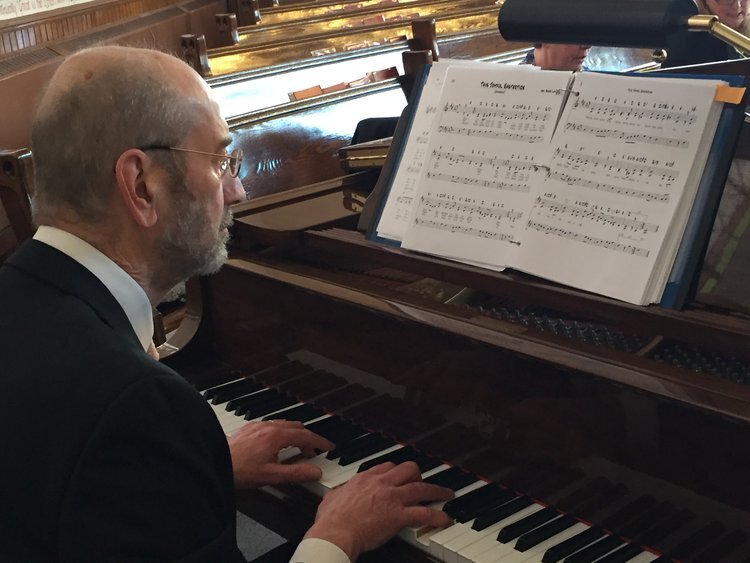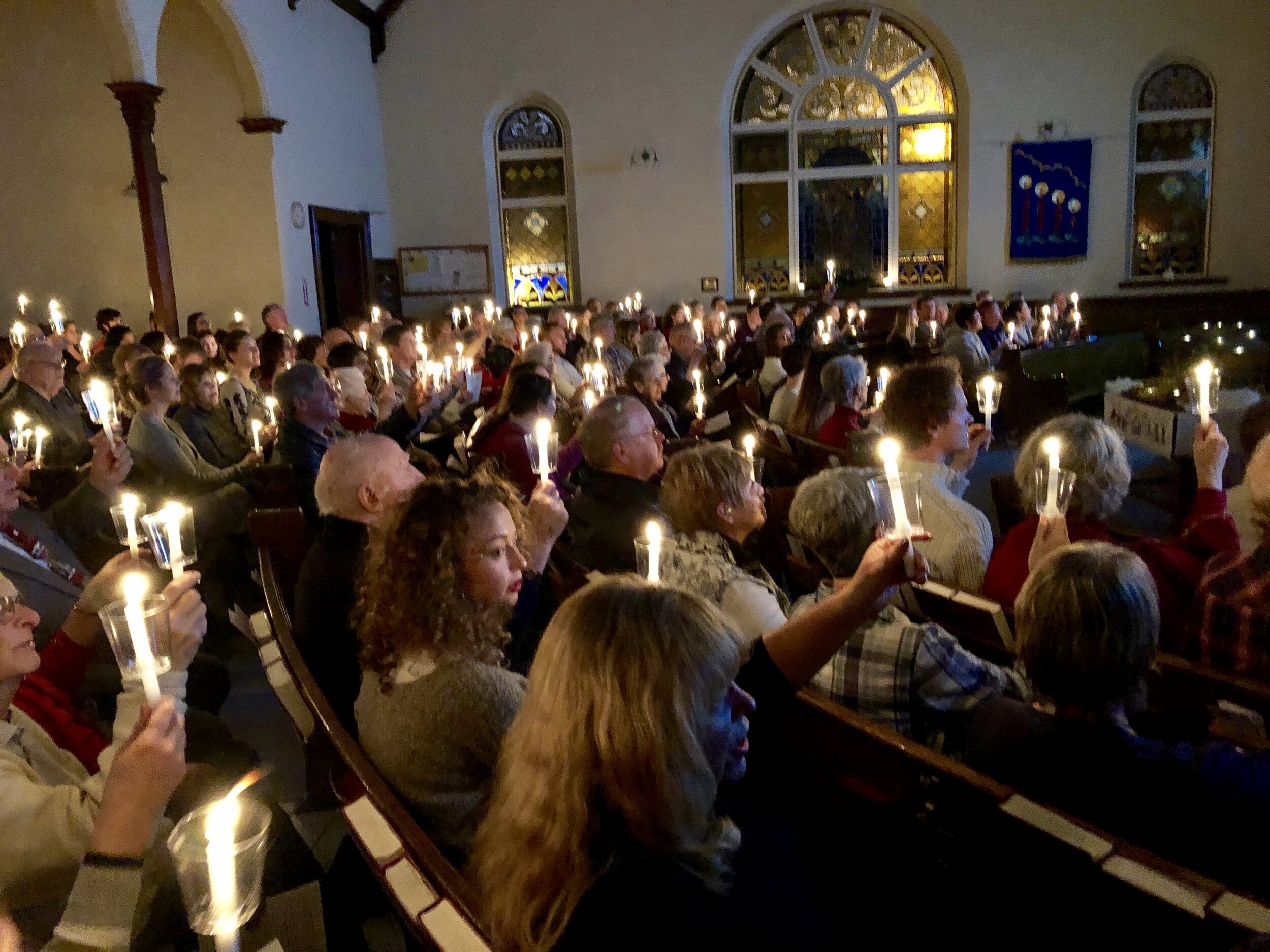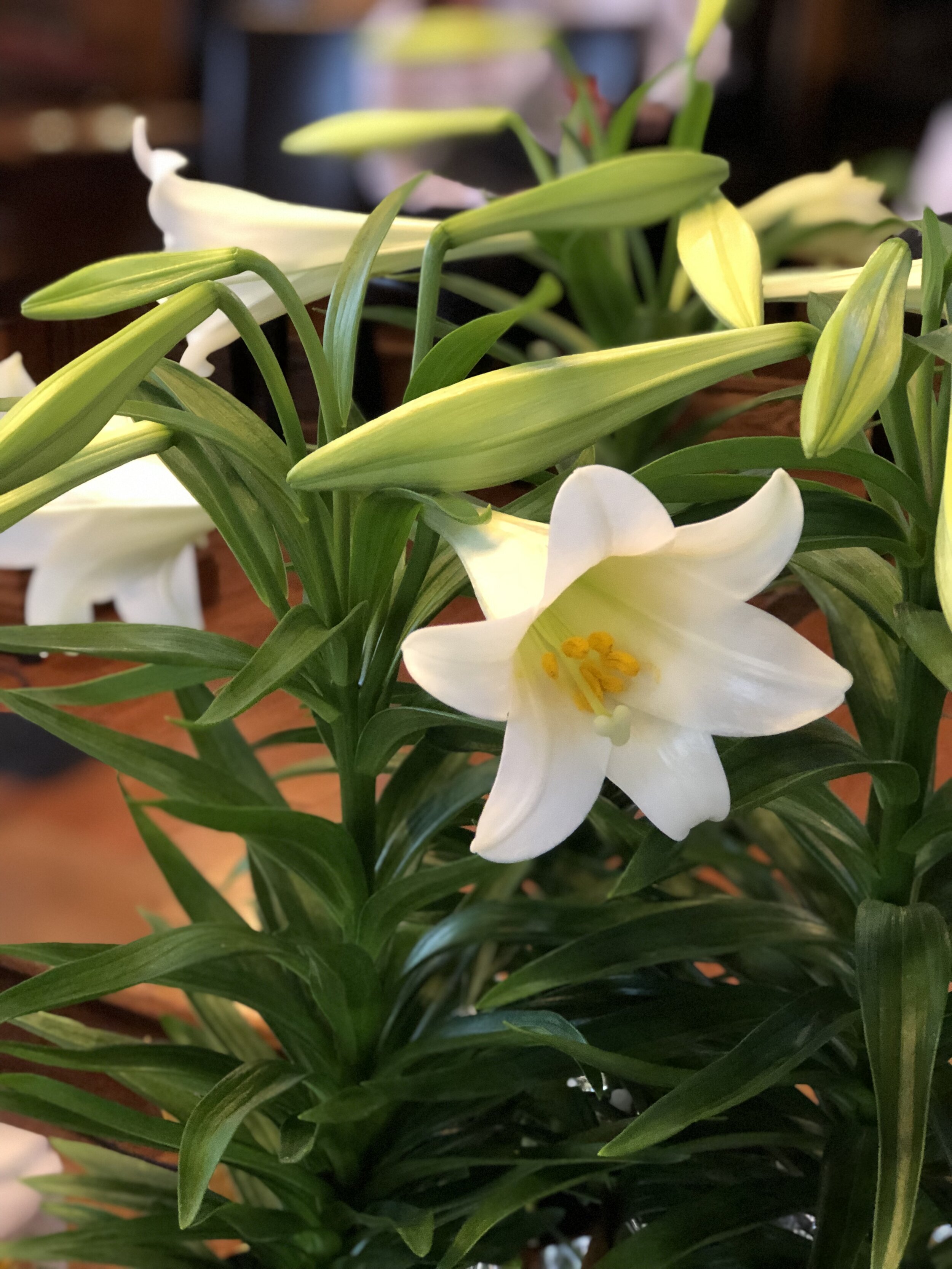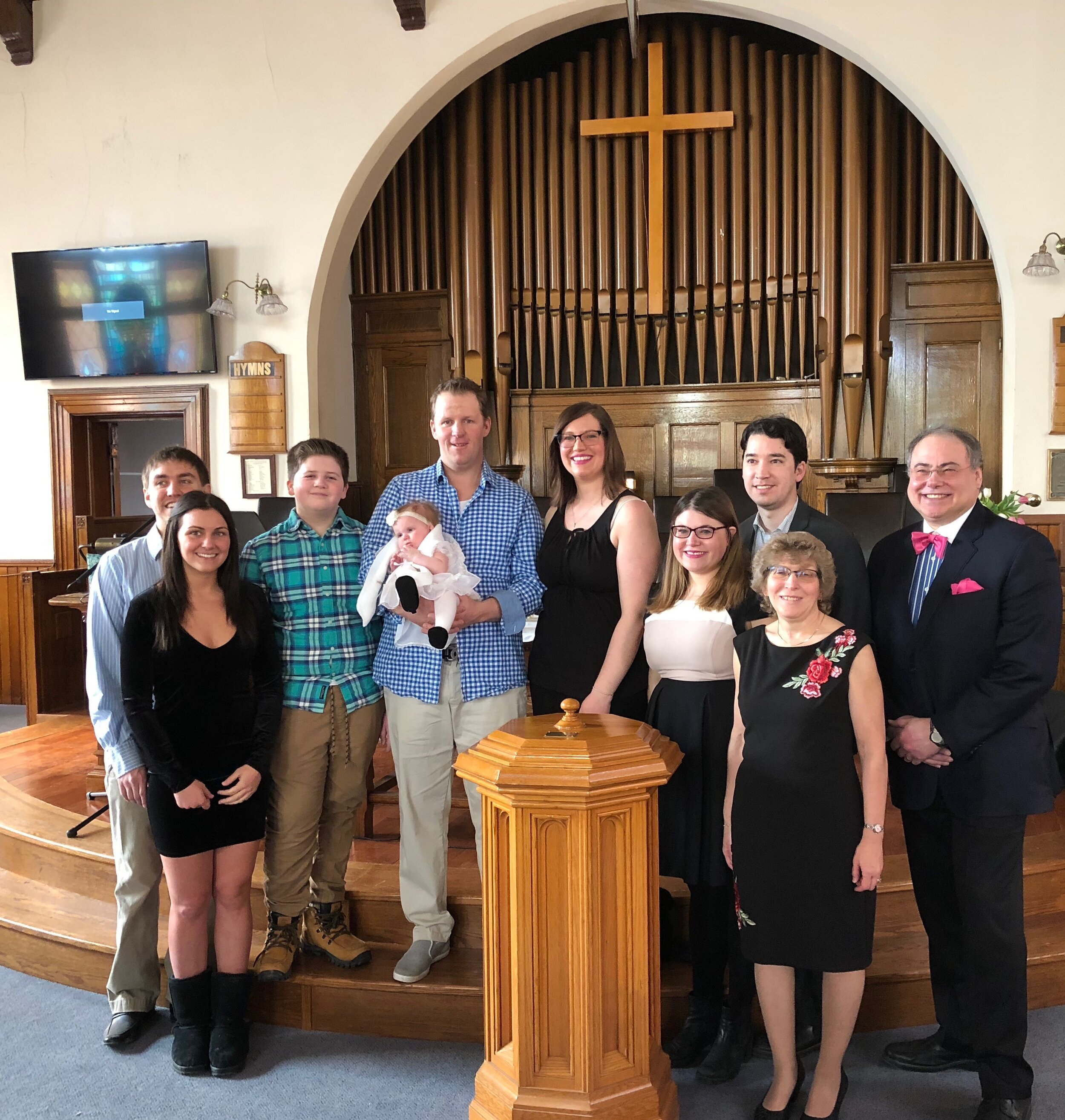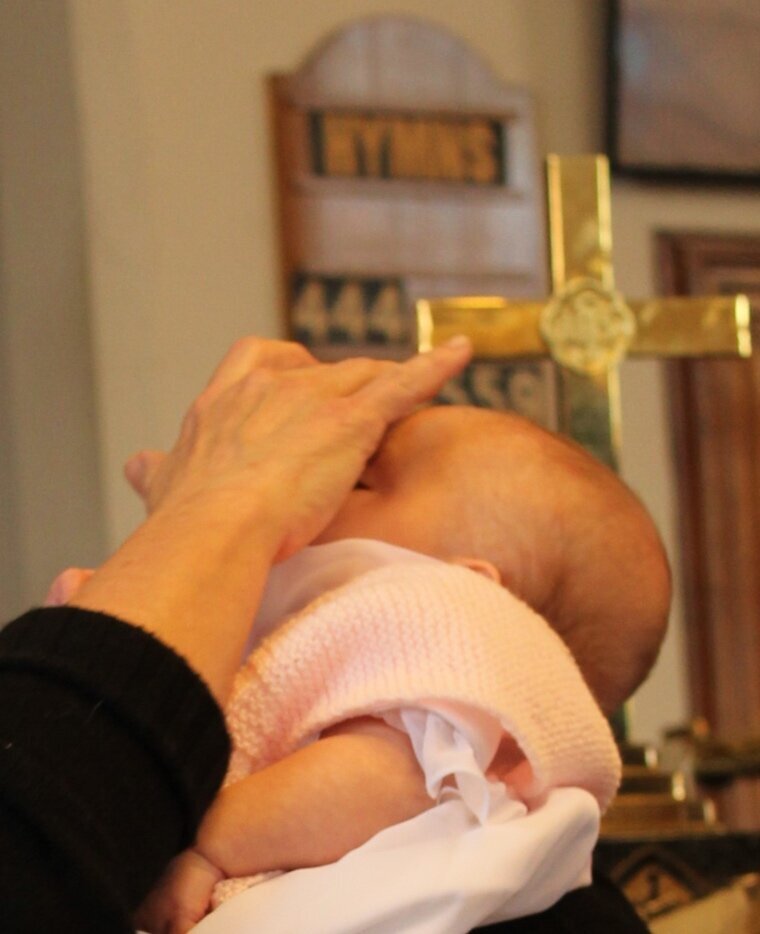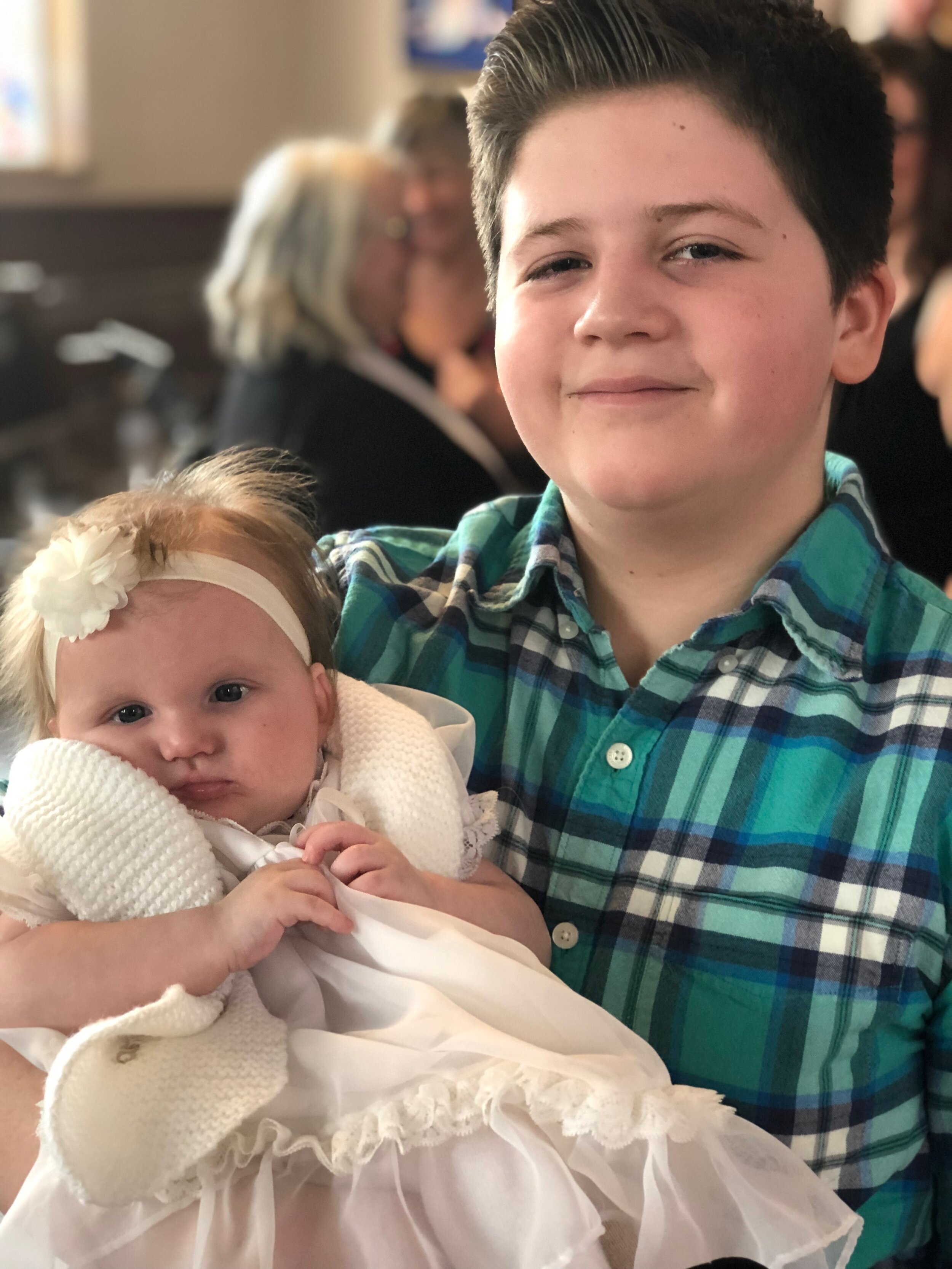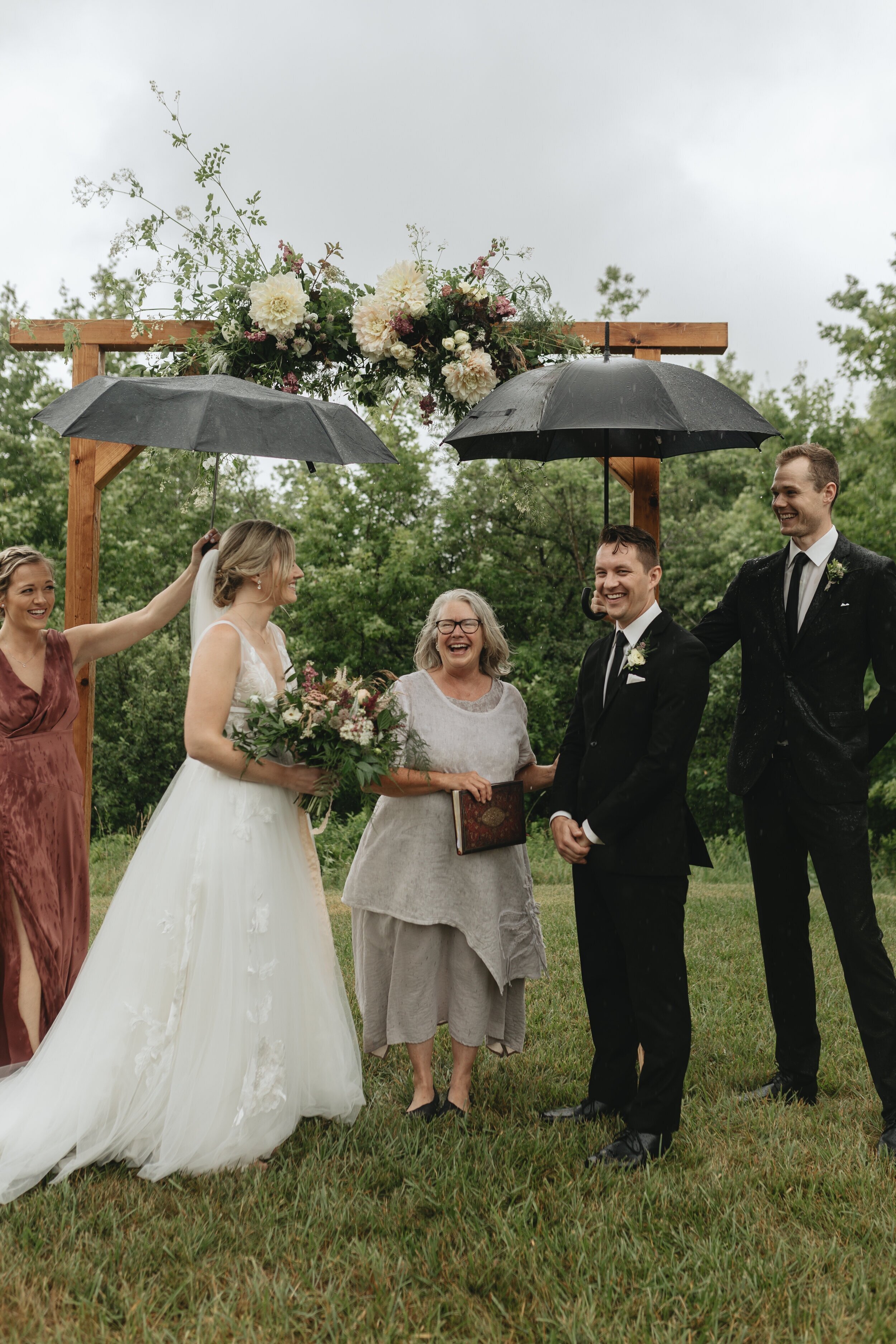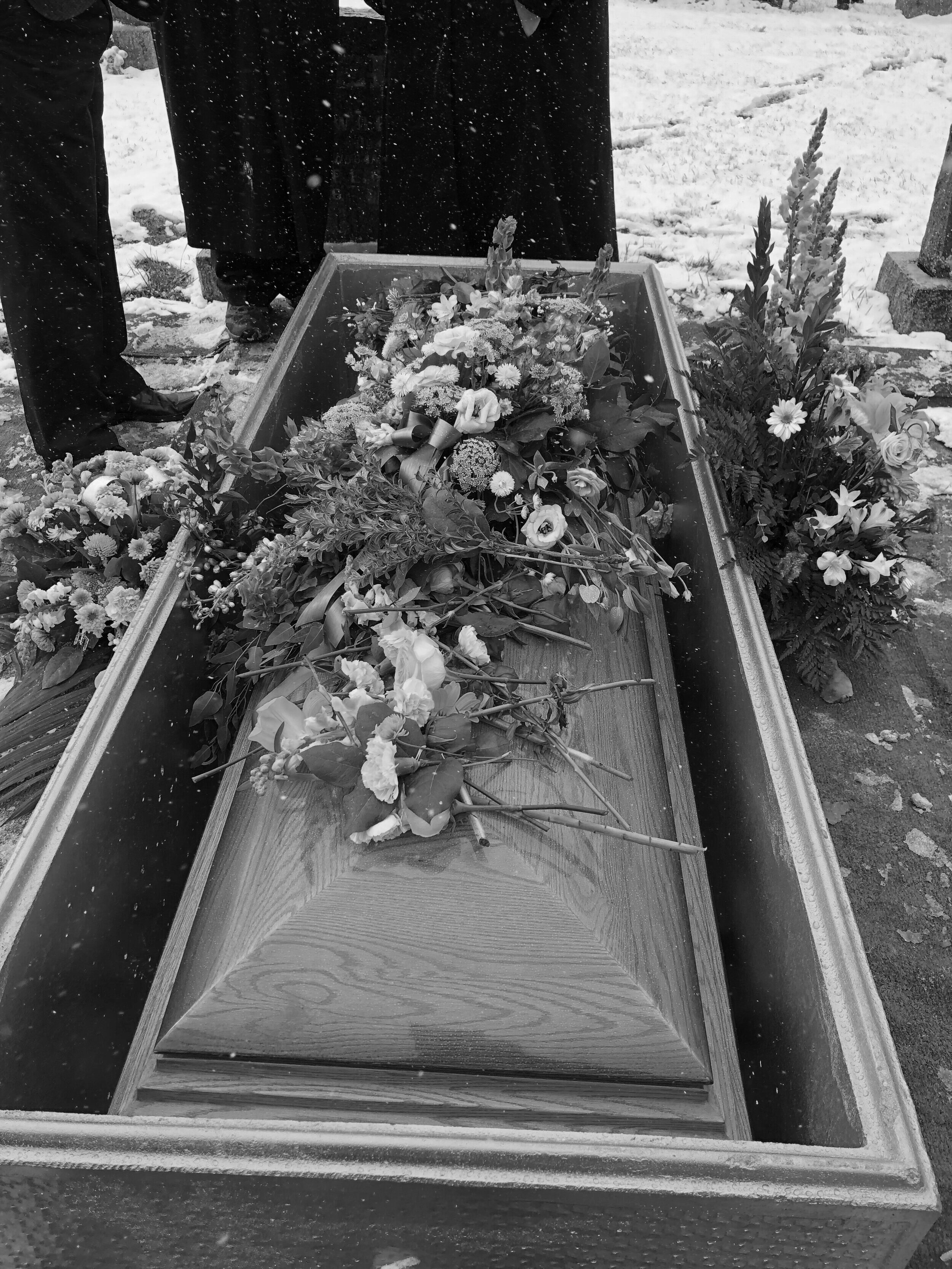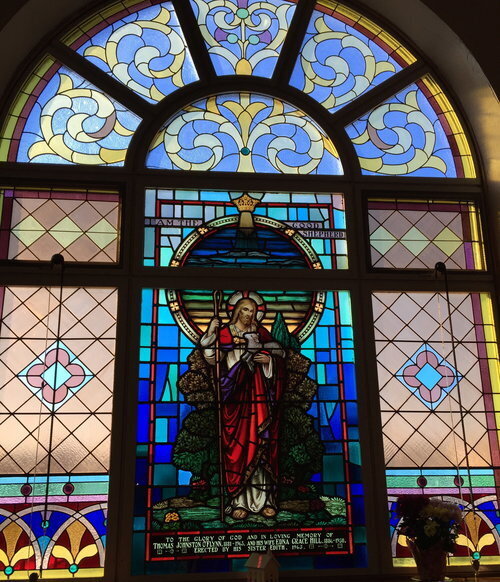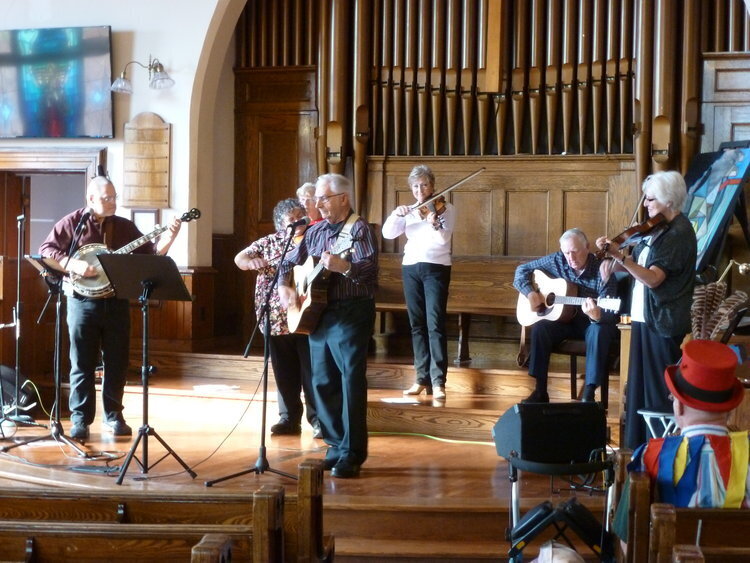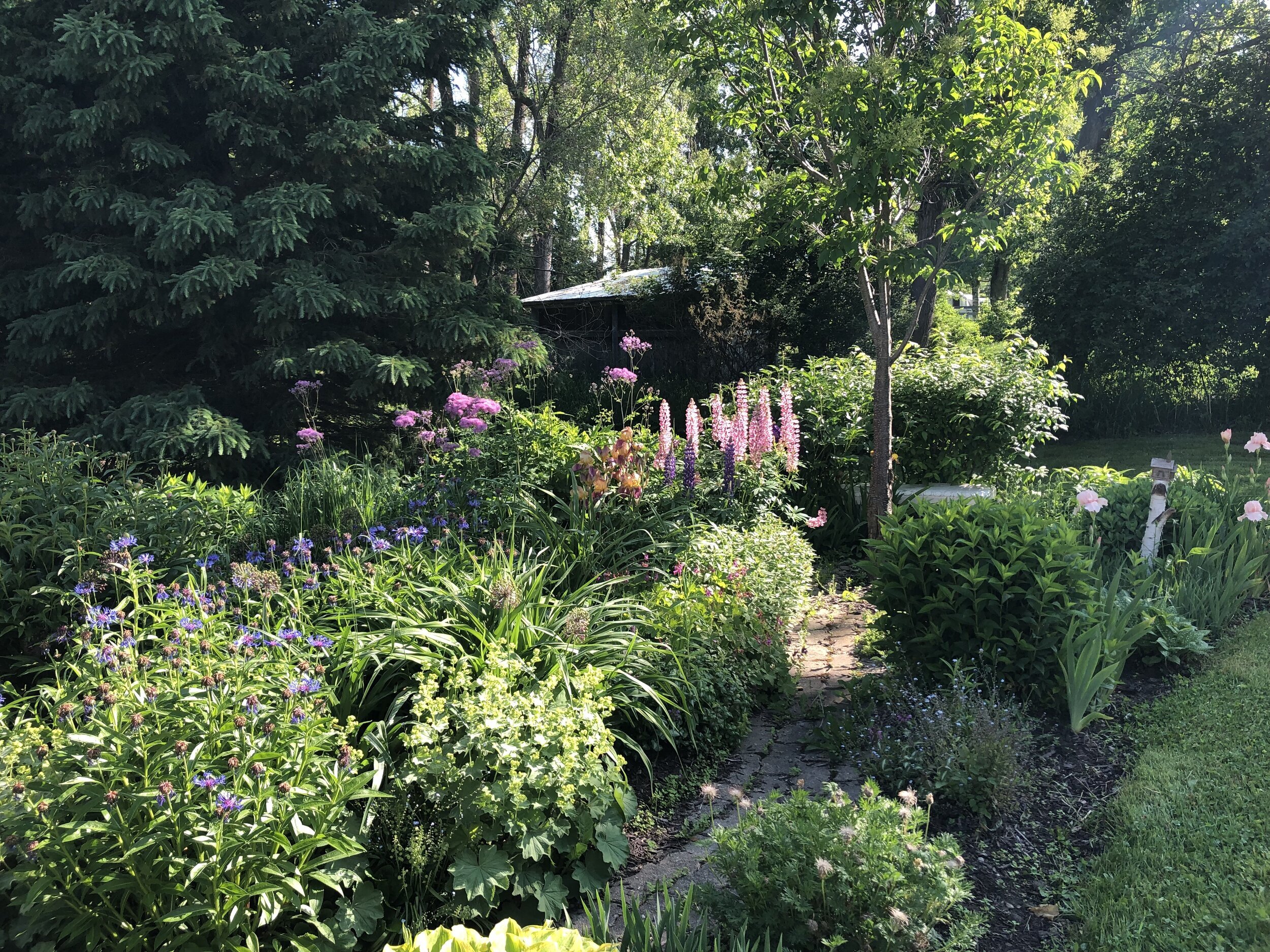
Our services
Sunday morning service
Service time
Trinity Primrose 11:00 AME ach week an hour-long Sunday morning service is offered. The services are formal enough to include some traditional hymn singing, but informal enough to explore the current culture, a rich diversity of sacred readings as well as scripture, and connections to the wider community.
There is a desire to learn how we might love more deeply, serve more faithfully, and follow in the ever-challenging footsteps of Jesus, reflecting a Christian Spirituality that is radically inclusive, compassionately engaged, and seeking to embrace the world with eyes wide open to the everyday suffering and stresses of life.
Trinity Primrose, having the large sanctuary, has a somewhat traditional feel to its services and is able to host larger gatherings, multi-faith conversations, and our Christmas Eve celebration.
Special services
lent & easter
The season of Lent, which is the six weeks before Easter, is a time of contemplation and reflection. Good Friday service, Saturday night vigil, and Easter Sunday Celebration are all part of the high holidays in the Christian calendar. It is said of Christians that they are an Easter people. This is to say that they are to be looking for all the possibilities around them, in joyfulness, but in sorrow and challenge too. And to know in great certainty, that when it seems there is no hope, no way out, no way forward, if one holds steady, a way previously unimagined will be made.
Advent & Christmas
The four weeks that precede December 25th make up the season of Advent - advent means ‘waiting’. Advent is also a time of reflection, a time to consider our lives and the way we are spending our time. Contrary to the general rush and business in the Christmas season, Advent is a time to slow down and be mindful. The Christmas season lasts 12 days beginning on the eve of December 24th and lasting through to sunset on January 5th, Epiphany Eve. In the Christian calendar, Christmas is not just one day, but a season of days, all of celebration.
other
Besides our two main liturgical seasons, we have special services for Thanksgiving Sunday, Remembrance Day, World Day of Prayer, World Communion Day, Anniversary, Father’s Day and Mother’s Day. We often have special music and speakers for these services.
Our rituals
A ll of time and space is sacred, but there are particular moments that we mark out as special. We do this in our ordinary lives by observing special holidays of significance. Our pastoral charge offers the following ritual services and gatherings and is happy to help you plan these gatherings.
Baptisms
Baptism has a long history in the Christian faith, beginning with John the Baptist down at the river Jordan gathering all the way ward folk who had wandered from the temple looking for renewal and restoration. And all these years later, we all still want renewal and restoration, for ourselves and for all those we love.
In the protestant tradition, and particularly in the United Church of Canada tradition, the baptizing of a baby is a sacrament of welcome. In our view, all babies of all faiths, are naturally born into the grand family of God, because God is simply that great mystery of MORE, of Wonder, of Astonishment, of Grace. And by definition, if you are born into this world, you are born into the arms of God in whom we live and move and have our being.
But baptism is seen, in our view, as a particular act of faith where a child is born into a particular Christian family within the larger family that includes all people. Baptism is always done in the church, with the church community in attendance, usually as part of the traditional Sunday morning service, unless there are particular circumstances which make this challenging.
Baptism in the United Church tradition, is in many ways, a sacrament for the parents for they are the ones called on to make public vows of fidelity to the way of love, as lived out by Christ. They must have a desire to bring their child up in a home that reflects the values of charity, forgiveness, grace, compassion, and of course, love. Will parents always do this perfectly? No, of course not. But there is a desire to do so, and a very real effort made to develop their own spirituality so as to be a model for their child.
Weddings
It is not necessary these days to be formally married, to take public vows that are in the best of circumstances often very difficult to keep. But to do so, to gather your family and friends together in a public commitment of your faith in another, is a marvellously courageous and daring act. It is a spiritual covenant of the highest order.
A spiritual covenant is not a contract, never mind that it is necessary to sign legal papers to appease the powers that be. Contracts have a different purpose and a different ethos than a covenant. We live in a world of contractual arrangements. You will do this for me. And I will do that for you. If you don’t do this for me, I am under no further obligation to complete my end of the contract.
But a covenant, in the ancient meaning of the world, is an all-together different matter. All marriages, in their highest sense, no matter the legal paperwork, are covenants because they do not bind one person to another, but each person to something higher, to a goodness and a grace and a love to which one vows to attend. In a covenant, one pledges to something beyond what one is actually capable of doing on one’s own, no matter how hard one would try, or with what good intention one puts forward.
In a covenant one is bound to honour the vow one takes regardless of the other’s error, independent of how faithful the other is to their vow. One’s loyalty is to the vow, not to the actions of the other. This is quite different from a contract, and calls for a great level of devotion and commitment.
Funerals, celebrations of life, & burials
Funerals, grave side internments, and celebrations of life all fall under the umbrella of pastoral care for our congregants and for the community at large. There is no fee attached to these services, not for the use of the church or the attentions of the minister. And you are most welcome to contact Rev. Bist if you need her care and attention for any of these services.
Funerals are traditionally done within the church and follow a certain liturgy. But within that form, there is much room for personal expression and focus on the deceased. Input is encouraged from the family if they wish special readings or to take part in any way. Internment may or may not be part of the funeral service, as the family requests. Funeral service remember, honour and celebrate the life of one particular person.
Internment or graveside services on their own are usually small, intimate family services. They can be deeply moving and though they are shorter than a full funeral service, every care is taken to make them meaningful.
Celebrations of life are just that — a celebration of a person’s life. They reflect the spirituality of the deceased and honour their passing with memories of what they brought into this world, and what they shared with others.
Our values
The Core Values
- Sanctuary for Everyone
- Radical Hospitality
- Endless Grace
- Active Compassion
- Enlightened Education
- Spiritual, Physical, Emotional, Mental Wellness
- Contemplative Practices
- Creative Possibilities
The value of sanctuary
We desire to be a sanctuary for compassionate care and spiritual nourishment by creating fully integrated community hubs partnering, both virtually and actually, with all those who desire, as we do, to extend grace into this world, contributing to the neighbourhood community in a spirit of radical, generous hospitality.
We engage the spirit through enlightened education and nourish the spirit through creative engagement with a wide variety of art forms.
We offer compassionate care locally to the immediate community by companioning with them through the various stages of life. We extend that same care into the wider world through socially active initiatives that deem all people to be of infinite value.
The value of community connections
We are currently partnered in some capacity with ten local community initiatives, two other faith traditions as well as a multi faith group, five international collectives and the ongoing support of EDGE, Embracing the Spirit and Community Innovation Hub.
Our history
The Shelburne Primrose Pastoral Charge consists of Trinity United Church, located in the town of Shelburne, and Primrose United Church, located in Mono township, both in southern Ontario. The congregations have been with The United Church of Canada since its creation in 1925, though both have been in existence in other forms for over 145 years.
Though each church has its own congregation, they share the spiritual leadership of one minister and work collaboratively under the guidance of a pastoral charge council. The character of each church is unique, reflecting their individual histories, location and interests.
Trinity United Church, which for many years served the farming community, living and working in the rich farmland of the Headwaters of Ontario, is now part of the rich and diverse group of people from varying faiths and cultures that calls Shelburne home.
Primrose United Church with its tall slim windows, white clapboard construction, and lovely gardens, reflects a much earlier time in Canadian history. Located in the beautiful township of Mono, you can always expect a warm welcome when you step through the sanctuary doors.
But the churches hold a shared vision of offering an inclusive, hospitable sanctuary for people to explore their faith in a modern, reflective context while learning how best to be good neighbours in the community and partnering with all others who wish, as we do, to offer grace and goodness in this world.
Our historical roots
We stand firmly with the United Church of Canada, adhering to their open and inclusive statements of faith. Theologically we are part of the reform tradition that calls us to be ‘reformed, and always, reforming.’ This means we are willing to ask the hard questions, seeking to live into the answers.
The early Christians were called ‘People of The Way’. And that way, was the way of love, the way of sanctuary and grace offered to all people, in all situations, at all times. The United Church of Canada takes up the call to be ‘People of the Way’ in the 21st century. And we stand with them.
The United Church of Canada
The United Church of Canada is the largest Protestant denomination in Canada. It ministers to over 2 million people in about 3,000 congregations. The history of the United Church is closely entwined with the history of Canada itself.
The United Church was inaugurated on June 10, 1925 in Toronto, Ontario, when the Methodist Church, Canada, the Congregational Union of Canada, and 70 per cent of the Presbyterian Church of Canada entered into a union. Also joining was the small General Council of Union Churches, centred largely in Western Canada. It was the first union of churches in the world to cross historical denominational lines and received international acclaim.
Each of the founding churches had a long history in Canada prior to 1925. The movement for church union began with the desire to coordinate ministry in the vast Canadian northwest and for collaboration in overseas missions. Congregations in Indigenous communities from each of the original denominations were an important factor in the effort toward church union.
The United Church continues to be a “uniting” church and has been enriched by several additional unions since 1925. In 1930, the Synod of The Wesleyan Methodist Church of Bermuda became part of The United Church of Canada’s Maritime Conference. The Evangelical United Brethren Church became part of The United Church of Canada in 1968. In addition, various individual congregations from other Christian communions have become part of the United Church over the years.
More information
The United Church of Canada ⟶
History of The United Church of Canada ⟶
Wikipedia: The United Church of Canada ⟶
Our spirituality
Our spiritual framework
Following in the reform tradition (a.k.a. the churches that emerged after The Reformation), the United Church of Canada has developed a number of ways of exploring the foundations of faith. It is so important to know that this is an on-going process, this exploration, and part of the fun of being ‘people of the way’.
We are sojourners, discovering anew each day what it means to love God and love others. It is a fascinating journey, rich in nuance and endless discovery. Here are three samples of attempts to capture what we are trying to understand, and more importantly, to live out.
-
Faith and the Bible
The Bible is the shared standard for our faith, but members are not required to adhere to any particular creed or formulation of doctrine.
Marriage
Each person is a unique, loved creation of God; we welcome all people to the full life of Christian community, including marriage.
Social Justice
Following the example of Jesus, we believe that we strengthen one another to work, through God's grace, for a better world.
Baptism and Communion
The United Church celebrates two sacraments—baptism and communion—by which we encounter the presence and goodness of God.
Relationship and Inclusion
Respectful of the religious practice of all people of goodwill, we are a welcoming church that is challenged to ongoing renewal.
Giving, Generosity, and Gratitude God’s endless generosity to us encourages our own response to contribute in many ways to God’s mission in God’s world. -
A Song of Faith, adopted in 2006, seeks to provide a verbal picture of what The United Church of Canada understands its faith to be in the historical, political, social, and theological context of the early 21st century. It is also a means of ongoing reflection and an invitation for the church to live out its convictions in relation to the world in which we live.
God is Holy Mystery, beyond complete knowledge, above perfect description.
Yet, in love, the one eternal God seeks relationship.
So, God creates the universe
and with it the possibility of being and relating.
God tends the universe,
mending the broken and reconciling the estranged.
God enlivens the universe,
guiding all things toward harmony with their Source.
Grateful for God’s loving action,
We cannot keep from singing.
With the Church through the ages,
we speak of God as one and triune:
Father, Son, and Holy Spirit.
We also speak of God as
Creator, Redeemer, and Sustainer
God, Christ, and Spirit
Mother, Friend, and Comforter
Source of Life, Living Word, and Bond of Love,
and in other ways that speak faithfully of
the One on whom our hearts rely,
the fully shared life at the heart of the universe.
We witness to Holy Mystery that is Wholly Love…
Read in full -
“The Bible is the shared standard for our faith, but members are not required to adhere to any particular creed or formulation of doctrine.
The United Church does, however, from time to time produce statements of faith that articulate our theology in the language of the time. A New Creed is a well-loved statement of faith used in many United Church congregations.”
We are not alone,
we live in God’s world.
We believe in God:
who has created and is creating,
who has come in Jesus,
the Word made flesh,
to reconcile and make new,
who works in us and others
by the Spirit.
We trust in God.
We are called to be the Church:
to celebrate God’s presence,
to live with respect in Creation,
to love and serve others,
to seek justice and resist evil,
to proclaim Jesus, crucified and risen,
our judge and our hope.
In life, in death, in life beyond death,
God is with us.
We are not alone.
Thanks be to God. -
We celebrate the rich spirituality of other faith traditions. The United Church, believing that God is creatively and receptively at work in the religious life of all humanity, has long been involved in interfaith dialogue and action to build respectful mutual relationships. Several landmark resources trace a record of this ongoing journey.
Mending the World (1997) articulated the broad principles of “whole world ecumenism.”
Bearing Faithful Witness, looks at the United Church of Canada relations to the Jewish faith, he first in a series of church-wide interfaith studies.
That We May Know Each Other: United Church-Muslim Relations Today started from the assumption that our “journey of understanding … must ultimately come from face-to-face contact, from conversation, from hospitality, and from friendship.”
Divine in Each Other: United Church-Hindu Relations Today, is a study on a proposed interfaith statement on the relationship between the United Church and members of the Hindu religion that is currently underway. -
We now stand at a crucial time in the life of the church, and the history of Canada, when we can see the journey through. For more than thirty years, the United Church and Indigenous peoples have been on a journey towards mutuality, respect and equity. Towards reconciliation. Towards justice.
Reconciliation and Indigenous Justice
Our sacraments
A sacrament is a symbolic action, or ritual, by which people of faith encounter the presence and goodness of God. In a sacrament, ordinary things like water, bread, and wine are used to point us to God and God’s love, reminding us of the sacred in life.
In the United Church, we celebrate two sacraments: baptism, the ritual that formally recognizes we belong to the Christian community, and communion, a symbolic meal initiated by Jesus. These sacraments are of central importance to our faith.
In company with the churches
of the Reformed and Methodist traditions,
we celebrate two sacraments as gifts of Christ:
baptism and holy communion.
In these sacraments the ordinary things of life
—water, bread, wine—
point beyond themselves to God and God’s love,
teaching us to be alert
to the sacred in the midst of life.
-
Baptism is a symbolic action that signifies the new life God gives us as we join the church community. Baptism uses water as a symbolic cleansing that signifies the acceptance of new life within the church family. The sacrament of baptism is the single rite of initiation into the Christian community, the church.
The United Church offers baptism to all ages. We believe the gift of God's love doesn't depend on our ability to understand it, so we baptize people as infants right up through adulthood. With children, instruction is given to parents or sponsors to equip them for the child's Christian nurture. During the ceremony, which usually takes place as part of a regular worship service, everyone in the congregation pledges support for the child and their parents.
Rev. Bist would be delighted to speak to you about having your child baptized in the United Church of Canada tradition. Contact her today.
Baptism by water in the name of the Holy Trinity
is the means by which we are received, at any age,
into the covenanted community of the church.
It is the ritual that signifies our rebirth in faith
and cleansing by the power of God.
Baptism signifies the nurturing, sustaining,
and transforming power of God’s love
and our grateful response to that grace.
— A Song of Faith
Baptism is not a requirement for God's love. We believe people who die without baptism are in no way condemned, lost, or damned.
Baptism in the United Church is recognized by all denominations of the Christian church that practise infant baptism. Similarly, if someone has already been baptized in another church at any age, the United Church recognizes their baptism and welcomes them as Christians. -
The Lord’s Supper, Holy Communion, Eucharist—these different terms refer to the same sacrament shared by most Christian denominations, a symbolic meal.
Communion is celebrated at a table that suggests the dining table in our homes. At the communion table, we acknowledge that Jesus Christ is the host and all are guests. The meal uses the symbols of small pieces of bread and a taste of wine or juice to remind us of Jesus’ last supper with his followers and of God’s enduring love.
The United Church practises an open table, inviting all who seek to love Jesus to share in this family meal.
In the communion meal, wine poured out and bread broken,
we remember Jesus.
We remember not only the promise but also the price that he paid
for who he was,
for what he did and said,
and for the world’s brokenness.
We taste the mystery of God’s great love for us,
and are renewed in faith and hope.
— A Song of Faith
The Shelburne Primrose Pastoral Charge celebrates communion usually between six and eight times a year: First Sunday in Lent, (February/March) Palm Sunday, (March/April),Pentacost Sunday(May/June) Anniversary Sunday (June/October), World Communion Day (October), First Sunday in Advent (November/December), possibly on Christmas Eve (December) or the New Year (December/January).
Our vision
We are imagining a church that is not focused solely on Sunday morning worship but sees our sabbath morning worship as informing and nourishing the spiritual and compassionate work that takes place the rest of the week. The church would then become a centre for spiritual nourishment and compassionate care working within these four areas.
Engaging the Spirit
There is a myriad of ways we engage with the Great Mystery we have named God. Sunday morning services at both locations offer a time of contemplation and exploration of the Christian faith in a modern context.
Other ways of engaging the spirit include interfaith dialogues, contemplative days in the Primrose Meditation Garden, devotion to deep ecology and social justice concerns, 12 step spirituality, and warm conversations desirous of further understanding the divinity within ourselves, others, and the cosmos.
Nurturing the Spirit
The arts nourish the spirit, enliven the mind, and offer consolation to our weariness. In the endless possibilities that the arts offer, our souls are nourished, and the world enriched.
In the arts we find new expressions and ways of communicating our longing for connection with one another and the divine, in all its inherent complexity.
Compassionate Care Local
We offer palliative care as needed, home visits to those desirous of them, hospital visits as required, and ongoing crisis and emergency relief as well as a variety of ritual celebrations - weddings, baptisms, baby naming services, funerals and celebrations of life.
The ongoing care of those who gather under our spiritual umbrella in the neighbourhood is the compassionate ground from which all other adventures emerge
Compassionate Care Extended
Extending our embrace to the wider community, we have partnered with:
- the International Quiet Garden Movement
- the social justice work of KAIROS
- the peace-building work of Partera International
- ongoing refugee work with First Line for Syria
- The world-wide service of the UCC Mission and Service
As well as numerous local groups associated with larger organizations.
How is the Vision Realized?
The vision has as its framework these four supporting and interwoven sectors.
Space and Spirit
It is a very real challenge to reimagine the physical spaces in our current buildings to serve the community in our current culture. But here, at least, we may dream big, while working on smaller projects that are attainable.
Trinity is currently working with Faith and the Common Good on making their building more environmentally sustainable. Primrose is investigating the structure of their building to assess its viability for long term use.
Both churches are committed to the principles of grace, compassion and beauty as they provide sanctuary for everyone.
Communications
Communication comes in a myriad of forms these days, each with their unique contribution to the whole conversation.
The pastoral charge is committed to embracing the newer forms of social media at the same time it preserves the valued ways of communicating face to face and with telephone and mail for those who do not use technology. Each person is valuable. Each form of communication has its value also.
Partnerships
There are many people, initiatives and adventures who have similar goals to the pastoral charge – serving the greater good as we value all people. How can we work together to uplift one another and provide more for the neighbourhood and beyond?
We have formed some good partnerships and we continue to experiment with this model as we imaginatively seek out new conversations in our community with those who desire an eco commoning way of life.
Finances
The financial mechanisms supporting the church should be like a good framework, clearly in place and providing strength and clarity, but not leading the parade.
Much like the shift in communications to a variety of ways to engage in conversation, there is a shift around financial matters in both the ways that people give, and the reasons they do so.
We are making efforts to update our financial systems and offer digital ways of offering financial support.
Our leadership
Bruce Ley
Music Director
Bruce has been a professional musician since he was sixteen years old, and that goes back a ways. He has worked as a performer, composer, arranger, teacher, producer and musical director covering a wide variety of musical styles, from country to jazz to blues. He had a long career working as a studio musician and arranging/scoring in the television/film industry in Toronto.
In the past Bruce has done extensive television work, playing on Grand old Country and The Tommy Hunter Show and scoring for children's programs for TVOntario. You may have heard Bruce play locally with his jazz band, with Larry Kurtz in a blues ensemble, as solo pianist in various venues, or in a theatre production where he can be found performing and/or acting as musical director.


